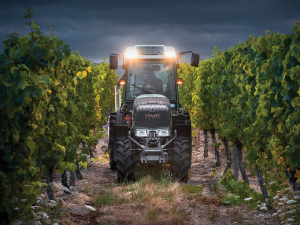Philip Gregan retires after 43 years of shaping the New Zealand wine industry
When Philip Gregan stepped into the New Zealand wine industry in 1983, it was awash with Müller Thurgau but rich with potential.
 One of the five key opportunities to cut greenhouse gas emissions in the wine industry is by replacing diesel and other fossil fuels with alternate fuels, such as biofuel or green hydrogen and electrifying farm equipment and machinery.
One of the five key opportunities to cut greenhouse gas emissions in the wine industry is by replacing diesel and other fossil fuels with alternate fuels, such as biofuel or green hydrogen and electrifying farm equipment and machinery.
The New Zealand Wine Roadmap to Net Zero 2050 lays out a pathway and practical guidelines to help vineyards and wineries meet the goal of being carbon net zero by 2050.
Launched at the industry’s Research & Innovation Forum in Wellington in late August, the Roadmap has been produced by New Zealand Winegrowers (NZW) in conjunction with the government agency EECA (Energy Efficiency & Conservation Authority) and thinkstep-anz, an independent sustainability firm. Karen Orr, EECA Sector Decarbonisation Programme Advisor, and Rosie Dodd, Senior Sustainability Specialist at thinkstep-anz, spoke to forum delegates about the Roadmap’s development and how the industry can use it to help reduce emissions as quickly and effectively as possible.
This pathway was started in 1995 with the inception of Sustainable Winegrowing New Zealand (SWNZ), under which 96% of vineyards and 90% of wine processed are now certified. In the past three decades, this industry-wide commitment to sustainability has contributed positively to New Zealand wine’s global reputation and has become increasingly important to consumers and trading partners, who are demanding ever-greater transparency and rigour in environmental credentials. Currently, 80% of New Zealand’s exports go to countries with climate and/or sustainability requirements and that trend is only expected to grow. In his introduction to the Roadmap, NZW Environment Committee Chair Fabian Yukich notes that climate change is the biggest long-term challenge facing the industry. “It will influence our choice of grape varieties, wine styles, viticultural techniques and regions, and importantly, the purchase decisions of our customers. Our response to climate change is critical to the reputation of New Zealand as a producer of high value, sustainable, premium quality wine.”
Karen outlined the three main areas to forum attendees: energy efficiency, empowering energy users, and accelerating renewable energy sources. The Roadmap details the industry’s current greenhouse gas (GHG) emission footprint and where the key opportunities are for reducing those emissions: improving energy efficiency, moving away from diesel, decarbonising electricity, innovating the value chain, and using carbon removals. It sets out where the industry needs to be by 2030, 2040 and 2050 to achieve these goals, with the three scopes of Direct Emissions (scope 1), Indirect Emissions (scope 2), and Supply Chain Emissions (scope 3) aligned with a series of targets, strategies and timeframes.
For each timeframe, there’s a series of suggested actions for vineyards and/or wineries, and a wealth of ideas for those wondering where to start. Both Karen and Rosie emphasised that engagement would be vital, with the sharing of information and, where appropriate, resources integral to this. Not everyone is starting from the same point and different producers will have different needs based on wine styles and market, she said, adding that getting started is the most important part, “regardless of where that is”, and the best time to start is now. The Roadmap is expected to function not only as an industry starting point but also as a living document that will be adapted over time as data continues to be gathered and technologies change.
Following on from the Roadmap’s presentation, Fabian led a panel discussion with Professor Anita Wreford, an applied economist from Lincoln University who works on primary sector climate change adaptation policy, Peter Jones, Director of The Landing in Northland, which is certified carbon positive, and Josh Barclay, Sustainability Manager at Marlborough’s Whitehaven Wines. Peter and Josh gave firsthand practical insight into the types of projects they had undertaken as part of their decarbonisation pathways and discussed the unexpected social benefits of the changes, including staff engagement and retention. All three panellists were unanimous that global respect for quality and sustainability was an important driver, and that New Zealand had a lot to lose by not being at the forefront of this change. With the industry’s well established SWNZ platform, and proven ability to work together for the greater good, there is a real opportunity for New Zealand to become a leader in this space. Next stop, 2030.
Roadmap to Net Zero
Without action, the wine industry’s expected growth to 2040 will significantly increase emissions. To keep growing without increased greenhouse gas (GHG) emissions, the Roadmap to Net Zero lays out five key principles:
nzwine.com/en/sustainability/roadmap-to-net-zero
Jimmy Stewart is quite literally chipping away at circularity.
A Wine Marlborough Lifetime Achievement Award is “very premature”, say Kevin and Kimberley Judd, nearly 43 years after they came…
Wine tourism has evolved into a sophisticated, diverse and resilient part of the New Zealand wine sector's economy. Emma Jenkins MW talks…